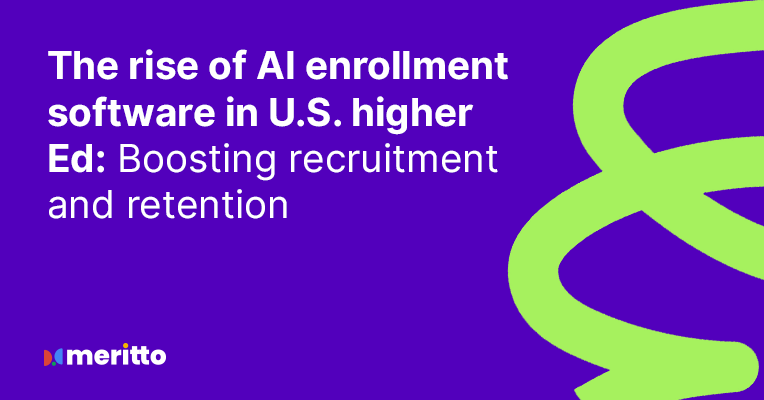In today’s competitive educational landscape, institutions across the U.S. are turning to AI-based enrollment software to streamline their recruitment efforts, improve retention, and optimize operations. The rise of artificial intelligence (AI) is transforming how universities and colleges engage with prospective students, offering tools to deliver more personalized, efficient, and data-driven enrollment experiences.
What is AI-based enrollment software?
AI-based enrollment software uses artificial intelligence and machine learning algorithms to automate and optimize various aspects of the student enrollment process. It helps institutions better engage with prospective students, from lead generation and nurturing to enrollment and retention.
By analyzing data from multiple sources such as website visits, email interactions, and application statuses this software allows institutions to predict student behavior. Institutions can gain insights into which students are most likely to apply, enroll, and succeed at their institution. This data-driven approach helps schools focus their recruitment efforts on high-potential students.
How AI-based enrollment software enhances recruitment
Recruiting students is becoming increasingly challenging, especially in the U.S., where the market is highly competitive. Traditional methods of recruitment, like cold calling and generic outreach are no longer enough.
AI-based enrollment software changes the game by enabling institutions to target and engage prospective students more effectively. By using predictive analytics, it helps identify the most promising leads and tailor recruitment efforts. For instance, a student who attended a program webinar may receive personalized follow-up emails about that specific program, keeping them engaged in the recruitment process.
Automation also plays a key role. Email sequences, chatbots, and reminders for application deadlines are automated, ensuring timely communication with prospective students. This automation not only saves time but also ensures that students receive relevant information, which is crucial for their decision-making process.
Improving retention with AI-based enrollment software
Retention is one of the biggest challenges facing U.S. institutions today. With declining enrollment numbers and rising dropout rates, colleges must find effective ways to keep students engaged.
AI-based software plays a key role in improving retention by providing insights into student behavior. It can flag students at risk of disengaging, based on factors like low attendance, poor grades, or lack of interaction with online courses. By identifying these students early, institutions can intervene with targeted support, such as academic advising or counseling, to help keep them on track.
AI can also provide reminders about important deadlines, course registrations, and other academic milestones. These proactive nudges ensure that students stay on top of their academic responsibilities, increasing the likelihood of retention and successful graduation.
Streamlining operations with AI-Based enrollment software
Managing the enrollment process manually can be inefficient and resource-intensive. Institutions often rely on several departments, admissions, financial aid, and advising to handle different parts of the enrollment process, leading to bottlenecks and delays.
AI-based software streamlines this process by automating routine tasks and centralizing data in a single platform. For example, it can automatically process applications, reducing the workload on admissions staff and freeing them up to focus on more strategic tasks.
Integration with other institutional systems such as financial aid platforms and course registration systems, further enhances the efficiency of operations. By providing a seamless experience for both students and staff, AI-based enrollment software ensures smoother workflows and faster decision-making.
The future of AI-Based enrollment software in higher education
AI technology is evolving rapidly, and its impact on the education sector is expected to grow even more in the coming years. Future AI-based enrollment software will likely offer even deeper insights into student preferences and behaviors, making it easier to personalize outreach and predict trends.
Advancements in natural language processing (NLP) and conversational AI will also play a major role. AI-driven chatbots will become more sophisticated, conducting real-time conversations with prospective students, answering questions, and even helping them complete applications.
AI will continue to improve its predictive capabilities, helping institutions better plan for future cohorts and allocate resources more effectively. By staying ahead of these developments, institutions can ensure they remain competitive in a rapidly changing educational environment.
Why Meritto’s AI-Based enrollment software is a smart choice for your institution
When choosing AI-based solutions for enrollment management, Meritto’s AI-powered enrollment software stands out. It’s designed specifically for higher education and offers a unified, purpose-built CRM that supports institutions at every stage of the student lifecycle, from recruitment to retention and beyond.
Meritto’s platform uses advanced AI to provide actionable insights, automate communication workflows, and optimize student engagement. With 24/7 support, your team can rely on Meritto to reduce their workload and focus on building stronger relationships with students.
Meritto’s AI-based enrollment software is not just about technology; it’s about enhancing your institution’s ability to connect with students more meaningfully. It allows you to stay competitive in a challenging market and ensure that both recruitment and retention efforts are as efficient and effective as possible.
By incorporating Meritto into your institution’s enrollment strategy, you can take advantage of cutting-edge technology that helps you achieve better results without increasing workload or resource strain. AI is shaping the future of higher education—make sure your institution is part of that future. Schedule a personalized demo today.
- How Voice AI Agents scale student engagement and lead nurturing
- The 3P framework for predictable student enrollment growth in 2026
- What’s shaping student recruitment, retention, and reputation in the UAE
- Inside the UAE’s shift toward AI-driven higher education
- What’s new at Meritto: The quarterly roundup




